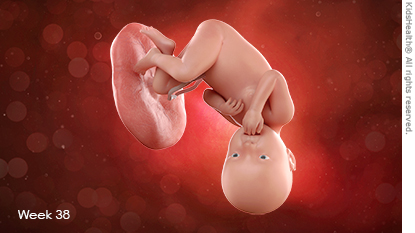- Home
- Humana Medicaid
- Kentucky Medicaid
- Medicaid extras
- Health and wellness
- Parents Home
- Para Padres
- A to Z Dictionary
- Allergy Center
- Asthma
- Cancer
- Diabetes
- Diseases & Conditions
- Doctors & Hospitals
- Emotions & Behavior
- First Aid & Safety
- Flu (Influenza)
- Food Allergies
- General Health
- Growth & Development
- Heart Health & Conditions
- Homework Help Center
- Infections
- Newborn Care
- Nutrition & Fitness
- Play & Learn
- Pregnancy Center
- Preventing Premature Birth
- Q&A
- School & Family Life
- Sports Medicine
- Teens Home
- Para Adolescentes
- Asthma
- Be Your Best Self
- Body & Skin Care
- Cancer
- Diabetes
- Diseases & Conditions
- Drugs & Alcohol
- Flu (Influenza)
- Homework Help
- Infections
- Managing Your Weight
- Medical Care 101
- Mental Health
- Nutrition & Fitness
- Q&A
- Safety & First Aid
- School, Jobs, & Friends
- Sexual Health
- Sports Medicine
- Stress & Coping
Pregnancy Calendar: Week 38
Your Baby's Development
Your baby weighs about 6 pounds, 6 ounces (2,900 grams) now and measures about 13.4 inches (34 cm) in length from crown to rump. Fat is still building, although growth is slower now. You may notice that your weight gain has slowed or stopped.
Your baby has been able to suck and swallow amniotic fluid, so waste material has built up in the intestines. Cells shed from the intestines, dead skin cells, and lanugo hair are some of the waste products that make meconium, a greenish-black substance that is your baby's first bowel movement.
If you're having a boy, his testicles have dropped into the scrotum, unless he has a condition called undescended testicle. If you're having a girl, the labia are now completely developed.

Your Body
 Because your baby is engaged in your pelvis, your bladder is very compressed, making frequent bathroom trips a necessity.
Because your baby is engaged in your pelvis, your bladder is very compressed, making frequent bathroom trips a necessity.
If you're having a boy, have you and your partner made a decision about circumcision? This surgical procedure removes the foreskin of the penis in male babies. For some parents, the decision about whether to circumcise is easy; for others, it's not. Talk to your health care provider about the issues surrounding circumcision, including pain relief options for the baby.

© 1995- The Nemours Foundation. KidsHealth® is a registered trademark of The Nemours Foundation. All rights reserved.
Images sourced by The Nemours Foundation and Getty Images.
